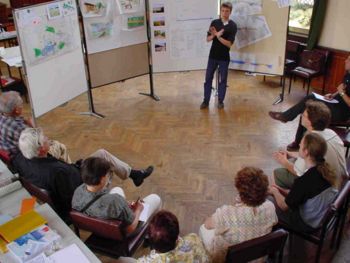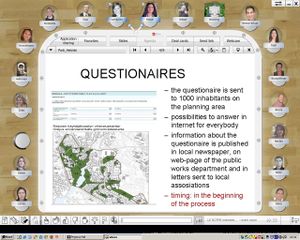Cultural Landscapes 2010: Difference between revisions
Heike.kaiser (talk | contribs) m (→Target Group) |
Heike.kaiser (talk | contribs) m (→Target Group) |
||
| Line 42: | Line 42: | ||
== Target Group == | == Target Group == | ||
* '''Advanced landscape architecture students''' (third year of Bachelor's program or Master‘s level) of LE:NOTRE/ LE:NOTRE Mundus member universities. | * '''Advanced landscape architecture students''' and related study fields (third year of Bachelor's program or Master‘s level) of LE:NOTRE/ LE:NOTRE Mundus member universities. | ||
* The course language is '''English'''. | * The course language is '''English'''. | ||
* A '''good level of independence and willingness''' to work in a group and to use the internet for communication is expected. | * A '''good level of independence and willingness''' to work in a group and to use the internet for communication is expected. | ||
Revision as of 14:18, 7 April 2010
Seminar Focus and Concept
This seminar aims to introduce into the scope of consultation, participation and social inclusion in landscape and open space planning. Processes of consultation and participation are part of virtually all development, planning and design procedures in urban and rural areas. Structuring, analysing, documenting and reflecting these procedures is a task all professionals need to do. In the course of this seminar, students will not only get to know the theoretical and instrumental framework. In addition, they will be asked to apply these methods to projects they know well.
Learning Objectives
- Knowledge and understanding of social and planning theory, and skills to relate them to political and institutional situations, particularly to case studies
- Knowledge of processes and analytical methods applied to consultation and participation in landscape and open space planning / -design
- Skills to assess and apply tools such as presenting and visualising different interests, intentions, ideas, alternative concepts, plans and designs
- Ability to structure a planning and / or design process with scope for consultation, participation and social inclusion
- Competence to select and apply techniques suitable for these processes, and critically reflect upon aims, content, process, tools and outcome of a planning and/or design project
- Competence to work in an international team and to apply advanced interned-based technologies.
Contents
- Part A: Social and Planning Theories (lectures and compulsory readings)
- Part B: Methods of Process Analysis (introductory lecture and exercise)
- Part C: Evaluation of Participatory Tools (expert reports)
- Part D: Analysis of Relevant Case Studies (students apply methods to own cases)
- Part E: Reflection
Time Frame
- April 13: Internal introduction on technical requirements for new students
- April 20 - July 06, 2010: Official seminar period
- Meetings take place on Tuesdays from 6.00 - 7.30 p.m. CET in the LE:NOTRE Virtual Team Room
- Your local time? See Time Zone Conversion
- Please make sure to log in 15 mins before official starting time so that we can start the session on time with particular respect to our external speakers!!!
Structure and Schedule
* Detailed Structure and Draft Schedule
Seminar Assignments, Requirements and ECTS
- This seminar has a regular scope of 2 ECTS.
- Participants are expected to attend the plenary sessions on a weekly basis and to collaborate and communicate efficiently and successfully in small groups between single seminar sessions.
- The part assignments are
- a commented concept map and a process biography of one of the expert contributions
- a self-chosen case study report due to our case study template incl. a process biography of the planning project (online documentation and presentation in June 2010 as contribution to the seminar)
Target Group
- Advanced landscape architecture students and related study fields (third year of Bachelor's program or Master‘s level) of LE:NOTRE/ LE:NOTRE Mundus member universities.
- The course language is English.
- A good level of independence and willingness to work in a group and to use the internet for communication is expected.
How to take part?
Interested students send a letter of intent by e-mail before April 20, 2010 to Heike Kaiser, Kassel University, Germany (hekaiser(at)asl-uni-kassel.de). Later registrations might be considered as well, but students should start in time to keep up with the overall process. Depending on the level of interest, places may be limited to one student per university. However, one student can act as a contact person for the seminar in case you want to participate as a university group.
Technological Requirements
- stable internet connection (DSL)
- PC or laptop with Windows operating system
- headset (microphone and earphones)
- registered participants will receive a link to the ViTeRo (Virtual Teaching Room) Program Homepage for download
Case Study Template
If your are preparing a case study presentation please build on this template: Mundus Case Study
How to contribute as a speaker
If you are contributing as a speaker in one of the plenary sessions you will be asked to prepare for a 20 - 30 minutes presentation in the form of a PowerPoint slideshow. Presentations are usually followed by a moderated discussion. You can ask for assistance of the seminar tutors in case you are not familiar with Powerpoint. Plenary sessions usually take 90 minutes (15 mins introduction, 30 mins presentation plus 30 - 45 minutes discussion).
Guidelines for presentations
Please consider the following aspects when you are preparing for a presentation:
- Please avoid written information on the slides except for the most essential statement and questions. As you will be talking synchronously to the audience there is absolutely no need to add much textual information on the slides.
- Please add many visuals and use the space given. You may not add a number of small images on one slide. Use several slides, each with one image.
- If you have questions to the audience (for example at the end in order to stimulate the discussion) you should visualise the question on the slide.
- Please send your presentation in good time to the seminar coordinator (at least one day before the meeting). We then have the chance to propose changes or additions in order to make your presentation more suitable for a virtual classroom setting.
Contact and Organisation
Dipl.-Ing MA sc. Heike Kaiser
University of Kassel Germany
hekaiser(at)asl.uni-kassel.de

